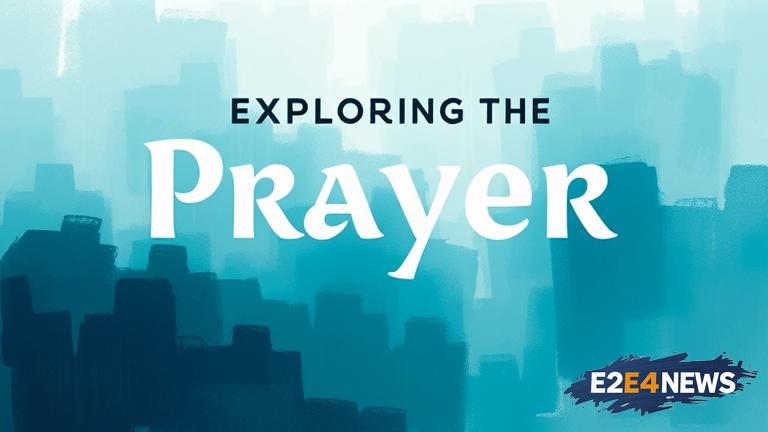As we navigate the complexities of our daily lives, prayer offers a profound means of connecting with a higher power, seeking guidance, and finding solace. The practice of prayer has been a cornerstone of faith traditions for centuries, providing a way to express gratitude, seek forgiveness, and cultivate a deeper sense of spirituality. In the Christian tradition, prayer is seen as a vital means of communicating with God, and is often characterized as a conversation with a loving and merciful deity. Through prayer, individuals can experience a sense of peace, comfort, and reassurance, even in the midst of challenging circumstances. Moreover, prayer can serve as a powerful tool for personal growth, enabling us to confront our fears, doubts, and weaknesses, and to develop a greater sense of self-awareness and compassion. The Bible teaches that prayer is a means of accessing God’s wisdom, guidance, and strength, and that it can be a source of healing, restoration, and transformation. In addition to its personal benefits, prayer can also have a profound impact on our relationships and communities, fostering a sense of unity, cooperation, and mutual support. When we pray together, we can experience a deep sense of connection and belonging, and can work towards creating a more just and compassionate world. The Lutheran tradition, in particular, places a strong emphasis on the importance of prayer, and encourages individuals to cultivate a regular practice of prayer and reflection. By doing so, we can deepen our understanding of God’s love and grace, and can become more effective instruments of God’s will in the world. Furthermore, prayer can be a powerful means of addressing social and economic injustices, and of advocating for the rights and dignity of all people. As we pray, we can become more aware of the needs and struggles of others, and can be inspired to work towards creating a more equitable and just society. In the context of the Lutheran church, prayer is often seen as a means of connecting with the broader Christian community, and of participating in a rich and vibrant tradition of worship and devotion. The church provides a variety of resources and opportunities for prayer, including worship services, prayer groups, and devotional materials. By engaging with these resources, individuals can deepen their prayer life, and can become more intentional and disciplined in their practice of prayer. Ultimately, the power of prayer lies in its ability to transform our lives, our relationships, and our communities, and to connect us with a deeper sense of purpose and meaning. As we embark on this journey of prayer and reflection, we can expect to encounter challenges and uncertainties, but we can also trust that God is always present, guiding and supporting us every step of the way. With patience, persistence, and an open heart, we can cultivate a rich and rewarding practice of prayer, and can experience the profound benefits that it has to offer. In conclusion, prayer is a vital and dynamic practice that can enrich our lives, our relationships, and our communities, and can connect us with a deeper sense of spirituality and purpose. By embracing this practice, we can become more faithful, more compassionate, and more effective instruments of God’s will in the world. As we move forward on this journey of prayer and reflection, we can trust that God will guide and support us, and that we will experience the transformative power of prayer in our lives. The journey of prayer is not always easy, but it is always worth it, for it is through prayer that we can experience the deepest and most profound sense of connection with God, with others, and with ourselves. By prioritizing prayer in our lives, we can become more intentional, more disciplined, and more faithful, and can cultivate a deeper sense of spirituality and purpose. In the end, the power of prayer is not just a theoretical concept, but a living and vibrant reality that can be experienced by anyone who is willing to embark on this journey of faith and reflection.
